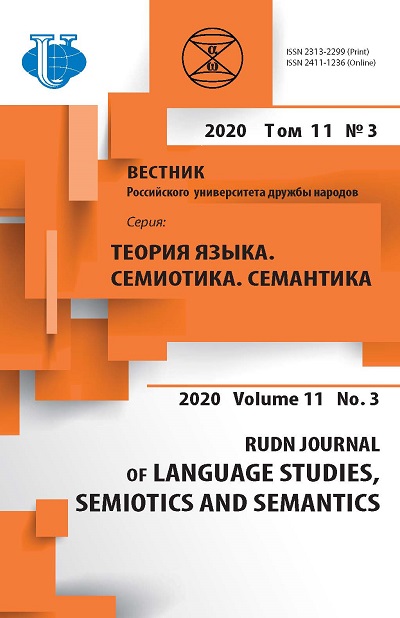Language as a Concept of Russian Aphoristics
- Authors: Korolkova A.V.1
-
Affiliations:
- Smolensk State University
- Issue: Vol 11, No 3 (2020)
- Pages: 434-447
- Section: COGNITIVE STUDIES IN LANGUAGE
- URL: https://journals.rudn.ru/semiotics-semantics/article/view/24598
- DOI: https://doi.org/10.22363/2313-2299-2020-11-3-434-447
- ID: 24598
Cite item
Full Text
Abstract
The article describes aphoristics as an integral part of the language and culture studies reflecting the value system of the people's mentality diachronically and synchronically. Russian aphoristics has been preserving national identity, morale and values throughout centuries, for generations transferring cultural and historic memory of the people. However, aphoristics reflects not only unique, specific features of Russian culture and mentality but also demonstrates unanimity of the culture codes and the universal character of human values. The study specially focuses on the Russian aphoristics’ sphere of concepts whereas, possible to outline and depict dozens of concepts specified on the level of culture as well. The concept LANGUAGE represents one of the key concepts of the human cognitive system, hence it is widely and diversely exposed in the corpus of the Russian aphoristics of the 18th-21st centuries. In aphoristics, LANGUAGE emerges in different ways. In Russian aphoristics, the specification of the concept LANGUAGE has got an ambivalent nature. Here LANGUAGE is realized in the homonymic phraseo-semantic field being verbalized by means of the most frequent components of the core and periphery of the phraseo-semantic field: LANGUAGE (Russian language, native tongue), foreign LANGUAGE, word, parole, syllable, etc.
About the authors
Anzhelika V. Korolkova
Smolensk State University
Author for correspondence.
Email: lika.korolkova@bk.ru
Grand PhD in (Philology) sciences, Professor, Department of literature and journalism
4, Przhevalsky str., Smolensk, Russian Federation, 214000References
- Telia, V.N. (1996). Russian phraseology. Semantic, pragmatic and linguocultural aspects. Moscow: Languages of Russian culture. (In Russ.).
- Likhachev, D.S. (1997). The conceptosphere of the Russian language In Russian literature. From the theory of literature to the structure of the text. Moscow: Academia. (In Russ.).
- Prokhorov, Yu.E. (2008). In search of a concept. Moscow: Flinta, Nauka. (In Russ.).
- Stepanov, Yu.S. (2007). Concepts. Thin film of civilization. Moscow: Languages of Slavic cultures. (In Russ.).
- Maslova, V.A. (2007). Linguoculturology: a textbook for students of higher educational institutions. Moscow: Gnosis. (In Russ.).
- Tokarev, G.V. (2003). A concept as an object of linguoculturology (based on representations of the concept of “Labor” in Russian) [monograph]. Volgograd: Peremena. (In Russ.).
- Popova, Z.D. & Sternin, I.A. (2007). Semantic and cognitive analysis of language [monograph]. Voronezh: Istoki. (In Russ.).
- Alefirenko, N.F. (2006). Language, Cognition and Culture: Cognitive-Semiological Synergetics of the Word [monograph]. Volgograd: Peremena. (In Russ.).
- Kubryakova, E.S. (2004). On the precepts of cognitive science and actual problems of cognitive linguistics. Issues of Cognitive Linguistics, 1, 6-17. (In Russ.).
- Korolkova, A.V., Lomov, A.G. & Tikhonov, A.N. (2007). Dictionary of Russian writers’ aphorisms, A.N. Tikhonov (Ed.). Moscow: Russian language Media. (In Russ.).
- Ivanov, E.E. (2016). Linguistics of aphorism. Mogilev: Moscow State University named after A.A. Kuleshov. (In Russ.).
- Fedorenko, N.T. & Sokolskaya, L.I. (1990). Aphoristics. Moscow: Nauka. (In Russ.).
- Tangir, K.M. (2007). Russian antinomic aphorisms: speech and language aspects of conflict and paradox. Krasnodar: Kuban State University. (In Russ.).
- Korolkova, A.V. (2018). Aphoristics in the context of Russian culture. Smolensk: SmolSU Publishing House. (In Russ.).
- Prokhorov, Yu.E. (1977). Linguistic and geographical description of aphoristics for educational purposes [dissertation]. Moscow. (In Russ.).
- Prokhorov, Yu.E. (1997). Aphorism In Russian Language: Encyclopedia, Yu.N. Karaulov (Ed.). Moscow: Bol’shaja sovetskaja jenciklopedija, Drofa. (In Russ.).
- Vereshchagin, E.M. & Kostomarov, V.G. (1990). National-cultural semantics of linguistic aphorisms In Language and Culture: Linguistic and Regional Studies in the Teaching of Russian as a Foreign Language. Moscow: Russian language. (In Russ.).
- Guchinskaya, N.O. (1993). Aphorisms as an intertextual version of a lyric-poetic text In Intertextual communications in a literary text. St. Petersburg: Obrazovanie. (In Russ.).
- Dmitrieva, O.A. (1996). On the ethnocultural specificity of proverbs and aphorisms In Language personality: cultural concepts Language personality: cultural concepts: articles. Volgograd-Arkhangelsk: Peremena. (In Russ.).
- Sharapov, I.P. (1996). Theory of aphoristics. Moscow: the author’s publishing house. (In Russ.).
- Shatalova, S.A. (2000). Linguistic foundations of the aphorist in literary texts F.M. Dostoevsky (based on the novels “Demons” and “teenager”) [dissertation]. Moscow. (In Russ.).
- Stepanov, Yu.S. (2004). Constants: Dictionary of Russian culture. Moscow: Academic Project. (In Russ.).
- Walter, H. & Mokienko, V.M. (2005). Antiproverbs of the Russian people. SPb: Publishing House "Neva". (In Russ.).
- Polyakov, Yu.M. (2013). The fringe of life. Aphorisms, thoughts extracted for reflection and for entertainme. Moscow: AST. (In Russ.).
- Shulezhkova, S.G. (2002). Сatch phrases of the Russian language, their sources and development. Moscow: Azbukovnik. (In Russ.).
- Berkov, V.P., Mokienko, V.M. & Shulezhkova, S.G. (2009). A large dictionary of catch phrases and expressions of the Russian language; in 2 vols. Magnitogorsk, MAU; Greifswald: Ernst-Moritz-Arndt-Universitāt. (In Russ.).
Supplementary files












